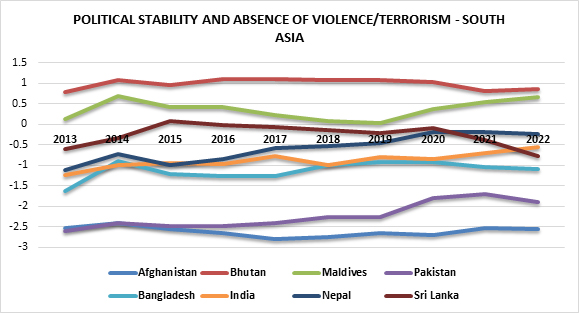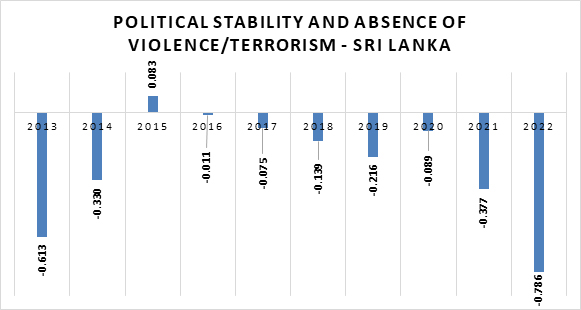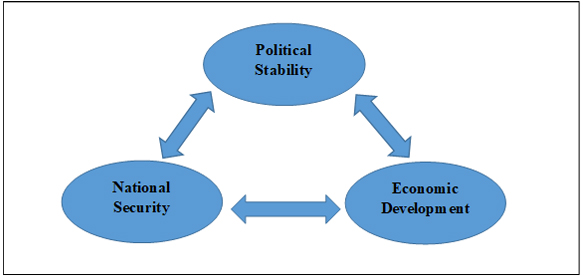by Kalpani Gunathilaka Danangalage
Published on The Morning on 02nd April 2024.
“There can be no long-term peace and security without development. There can be no long-term development without peace and security,” said the former United Nations (UN) Secretary-General, K. Annan in an article in the UN Chronicle in 2015.
Political stability is the cornerstone of a country's socio-economic development as it provides an environment conducive for investment, growth, and the implementation of long-term policies. Furthermore, it serves as a fundamental pillar in safeguarding the country’s national security. In the absence of political stability, a country may face numerous challenges such as economic uncertainty, social unrest, declined international standing and policy paralysis. Therefore, maintaining political stability stands as an imperative priority for any nation.
What does political stability mean?
C. Ake defined political stability in the Journal of Comparative Politics in 1975 as “members of society limiting their behaviour patterns to those constrained by political role-related expectations”. Any deviation from these boundaries is an example of political instability. Countries exhibiting a high level of political stability, which also implies the absence of terrorism and political violence, are those with robust social and environmental orientations, predominantly found in Western countries. Political stability also tends to be more prevalent in countries with democratic political systems. If a country enjoys political stability, its citizens harbour confidence and trust in their government and its ability to address their needs and desires. Consequently, there is a minimum risk of violence and social unrest occurring in such countries.
The status of political stability in SL
The World Bank (WB) annually measures the political stability index. Within the category of political stability and the absence of violence and terrorism, they assess perceptions regarding the likelihood of political instability and/or politically motivated violence, which includes terrorism.


Source: Prepared by the author based on the World Bank data, 2023
The above data indicates a significant decline in Sri Lanka's political stability from 2020 to 2022, particularly in comparison to other South Asian countries. When examining country specific data on political stability and the absence of violence or terrorism, there is a consistent increase observed from 2013 to 2015, followed by a continuous decline from 2016 to 2022, with a slight uptick in 2020. This WB data underscore remarkable political instability in Sri Lanka post-2020. In 2022, Sri Lankan citizens experienced profound social unrest during the ‘aragalaya’. This marked a historic moment as people rose against the existing regime, demanding political change and economic prosperity in the country. Hence, it becomes evident that there was substantial political instability in Sri Lanka during that period. As of this year (2024), the country has managed to achieve some degree of political stability. However, as Sri Lanka prepares to hold Presidential and General elections in2024, the political situation of the country is expected to become more heated.
Present status of the SL economy
According to data released by the Central Bank of Sri Lanka (CBSL) in their annual publication in 2022, the real economy contracted by 7.8% in 2022, marking the deepest contraction compared to the 3.5% growth in 2021. Inflation, based on the Colombo Consumer Price Index (CCPI), reached a historic high of 69.8% in September, 2022, primarily due to Sri Lankan Rupee depreciation, supply-related shortages, and increased monetary financing. Fiscal sector imbalances that had persisted for several decades reached a tipping point in 2022, with the lowest Government revenue and the highest Government expenditure recorded. The economic crisis resulted in severe hardships for individuals and businesses, particularly affecting lower- and middle-income individuals and small enterprises. Rising inflation exacerbated living conditions for the public and posed substantial challenges to businesses, including increased prices, high production costs, negative real returns, and declining real wages. Shortages of essential items such as pharmaceuticals, fuel, liquefied petroleum gas, food items, and industrial raw materials, coupled with a lack of foreign exchange liquidity, caused significant social suffering. These severe economic hardships led to heightened public anxiety and political unrest. Since 01 January, 2024, the Value Added Tax (VAT) has been increased up to 18% on a large number of goods and services as per the conditions set by the International Monetary Fund (IMF), further burdening people and exacerbating their financial struggles.
Present status of SL’s nat. security
Throughout much of the 20th Century, the concept of national security predominantly centred on military defence. However, over time, it expanded beyond the capabilities of armed forces alone. In 2015, former United States Assistant State Secretary Kim R. Holmes defined national security as “the safekeeping of the nation as a whole”, emphasising its paramount importance in protecting both the nation and its citizens from internal and external threats and attacks by maintaining armed forces and safeguarding state secrets. Yet, national security encompasses far more than military defence.
It extends to the economy, energy, environment, health, females and food security, reflecting a comprehensive approach to safeguarding a nation's well-being. This broader understanding of national security involves not only defending the nation but also protecting a range of geopolitical, economic, and other interests. Consequently, it influences not just defence-related policy but also foreign and other governmental policies.
A decade after the defeat of one of the world's most ruthless terrorist organisations, the Easter Sunday attacks in 2019 and the subsequent people's revolution, known as ‘aragalaya’ in 2022, starkly revealed the failure of the country's national security apparatus to respond effectively when needed. As a result, public confidence in both the political system and leadership responsible for national security has eroded. In response to these challenges, the Government has initiated measures to strengthen its security apparatus, including reforms within its military and intelligence agencies, and has collaborated with regional and international partners to address transnational threats. However, the current security situation in the country remains fraught with uncertainty. This uncertainty is not only impacting the daily lives of citizens in the short-term but also exerting long-term effects on the country's economy.
The interplay of political stability, econ. development & nat. security

Political stability, economic development, and national security are closely interconnected and mutually dependent factors for a country to function effectively. The absence of political stability undermines efforts to maintain national security and achieve economic growth. Without strong national security, political stability is at risk, hindering economic development. Meanwhile, strong economic development contributes to stability and security, creating an environment conducive to prosperity and progress. Therefore, these factors are not only interconnected but also vital components that support the foundation of a flourishing society.
How does political stability affect econ. development & nat. security?
A strong and stable political structure is a fundamental prerequisite for a country to achieve sustained economic growth. Economic growth and political stability are intricately linked. Uncertainty stemming from an unstable political environment can reduce investments and impede economic development. Conversely, poor economic performance may affect government collapse and political unrest. However, achieving political stability can sometimes involve oppressive measures or having a dominant political party that faces little competition for re-election. In such cases, political stability can become a double edged sword. Research conducted by Prof. Ali Acar at the Selcuk University in 2019 revealed that the absence of political stability has negative effects on economic development.
Countries with political stability have the opportunity to achieve economic development more rapidly and efficiently. When analysing the relationship between political stability and the economy, it becomes apparent that economic growth thrives where there is stability. It is widely agreed among economists that countries with strong economies and political stability experience faster growth compared to unstable economies. In developing economies, political instability often emerges as the most significant variable affecting the growth process. Businesses are more likely to flourish and expand in politically stable countries, leading to job creation, heightened productivity, and overall economic growth.
National security and political stability are indispensable factors for maintaining a stable and legitimate state. However, the rising number of corruption and bribery cases, along with power struggles between political parties, is exacerbating instability in the country. Under such conditions, achieving political stability becomes increasingly challenging. Consequently, societal frustration may lead certain individuals to neglect the rule of law. In military strategy, attacks are most effective when the enemy is weakened. Therefore, political instability creates an opportune moment for adversaries to launch attacks. Even if the Army remains the most disciplined fighting force in the country, they would be rendered vulnerable in the face of political turmoil. Despite the end of armed conflicts, the potential for future conflict, whether internal or external, remains if political and economic instability persists. Therefore, addressing political instability is crucial not only for national security but also for long-term stability and prosperity.
What further steps can SL take to enhance political stability?
Especially in developing countries, governments play a crucial role in ensuring successful economic development and national security. In this context, political stability is paramount as it underpins both development and a country's security. Policies should be formulated towards establishing sustainable governmental mechanisms that foster long-term benefits, such as reducing inflation, and unemployment, and fostering economic growth. However, achieving and maintaining political stability can be challenging, particularly in regions or countries grappling with issues like corruption, ethnic or religious tensions, social inequality, imbalanced foreign relations, economic challenges, weak institutions, or external threats.
Governments, political parties, civil society organisations, and other stakeholders must collaborate to tackle these challenges through effective governance, respect for human rights, inclusive policies, and a dialogue to build consensus and manage conflicts peacefully. A stabilised political climate in Sri Lanka will be pivotal in its recovery from the current economic downturn and in ensuring national security. By addressing these underlying issues and fostering political stability, Sri Lanka can pave the way for sustainable economic growth and security.
Link to the original source : Click here

* Mrs. Kalpani Gunathilaka Danangalage is a Research Assistant at the Institute of National Security Studies (INSS), the premier think-tank on National Security established under the Ministry of Defence. The opinion expressed is her own and not necessarily reflective of the institute or the Ministry of Defence